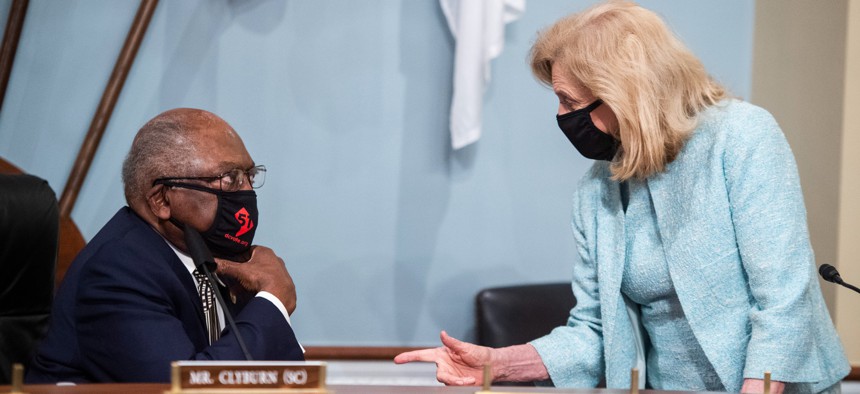
Reps. James Clyburn and Carolyn Maloney at a June 2020 hearing. Tom Williams/CQ-Roll Call, Inc via Getty Images
House Panel Launches Probe Into ID.me
The Committee on Oversight and Reform wants information about the identity verification company. At least nine other federal agencies and 30 state governments also use the service, the committee says.
The House Oversight Committee is launching a probe into identity verification company ID.me, asking for information about the work the company does with at least 10 federal agencies and 30 state governments.
"If ID.me is to continue working with federal agencies and state governments, it is vital to ensure the proper safeguards are in place to protect Americans' personal information and ensure their access to benefits for which they are eligible," reads a letter signed by Carolyn Maloney (D-N.Y.), chair of the House Committee on Oversight and Reform and James Clyburn (D-S.C.), chair of the House Select Committee on the Coronavirus Crisis.
The Washington Post first reported the investigation.
Among the concerns are the privacy and security of biometric data collected by the company, demographic bias in facial recognition technology and long wait times for ID.me verification.
"I am deeply concerned that the federal government lacks a clear plan, leaving agencies like the IRS to enter contracts worth tens of millions of dollars with questionable terms and oversight mechanisms," said Maloney in a statement. "Without clear rules of the road, agencies will continue to turn to companies like ID.me, which heightens the risk that essential services will be not be equitably provided to Americans, or will be outright denied, and that their biometric data won't be properly safeguarded," she continued.
The IRS specifically recently faced heat for its use of ID.me from the public and members of Congress of both parties before announcing in February it would adopt Login.gov after the end of the current tax season and that new options for verification that don't rely on facial recognition would be available for this tax season.
Since then, human rights and tech organizations have also pressured other federal agencies to stop their use of the company, or other facial recognition tools, for identity verification.
At least 27 states have also used ID.me's services within the unemployment insurance process as they grappled with fraud during the pandemic. The Department of Labor has a blanket purchase agreement with ID.me and other identity verification companies for states to tap into.
The House committee wants access to details like dates and number of users who gave ID.me biometric information under all of ID.me's government contracts. They also want information about biometric data retention policies and details about algorithms used by the company.
The committee is also drilling into the use of the company for unemployment insurance programs, drawing out concerns that the service impacts certain populations, like those without high-speed internet access - disproportionately.
One alternative option for identity verification for federal agencies is the General Services Administration's Login.gov, which does not currently use facial recognition technology, although it is "exploring ... how to address potential discrimination with facial recognition," the agency noted in recent budget documents.
The IRS announced it will add Login.gov after the end of this tax season, but the agency's response to a request for information from the House Oversight and Reform Committee lists the requirements that Login.gov has to meet before it can be used at the IRS, including certain levels of data security and technical capacity.
"It appears that IRS will continue to rely on ID.me for identity verification technology" while the IRS works with the GSA to add Login.gov, the new House probe letter says, also flagging that the "IRS did not indicate any current plans to cancel the ID.me contract or recoup any of the $86 million already spent for ID.me's licenses."
The contract lasts through 2023.
The committee wants answers from the ID.me by April 28.
"We look forward to providing important information to the Committee on how ID.me has expanded access to government for disadvantaged Americans, including individuals who do not have credit history, are underbanked, or are without a home," a press representative for ID.me told FCW in a statement. "ID.me remains a highly effective solution available for government agencies that provides the most access for under-served Americans."







